英语阅读(一)课文句子翻译
2020年译林版七年级上册英语课文翻译Unit1Thisisme!
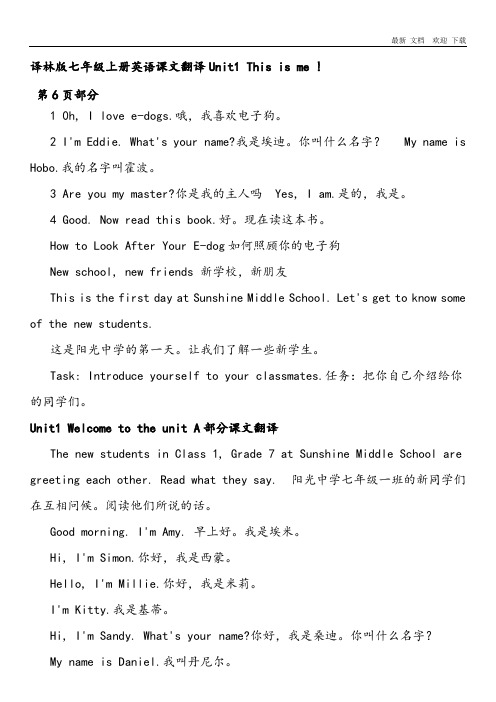
译林版七年级上册英语课文翻译Unit1 This is me !第6页部分1 0h, I love e-dogs.哦,我喜欢电子狗。
2 I'm Eddie. What's your name?我是埃迪。
你叫什么名字? My name is Hobo.我的名字叫霍波。
3 Are you my master?你是我的主人吗 Yes, I am.是的,我是。
4 Good. Now read this book.好。
现在读这本书。
How to Look After Your E-dog如何照顾你的电子狗New school, new friends 新学校,新朋友This is the first day at Sunshine Middle School. Let's get to know some of the new students.这是阳光中学的第一天。
让我们了解一些新学生。
Task: Introduce yourself to your classmates.任务:把你自己介绍给你的同学们。
Unit1 Welcome to the unit A部分课文翻译The new students in Class 1, Grade 7 at Sunshine Middle School are greeting each other. Read what they say. 阳光中学七年级一班的新同学们在互相问候。
阅读他们所说的话。
Good morning. I'm Amy. 早上好。
我是埃米。
Hi, I'm Simon.你好,我是西蒙。
Hello, I'm Millie.你好,我是米莉。
I'm Kitty.我是基蒂。
Hi, I'm Sandy. What's your name?你好,我是桑迪。
你叫什么名字?My name is Daniel.我叫丹尼尔。
新视角研究生英语读说写(1)课文翻译以及课后习题答案
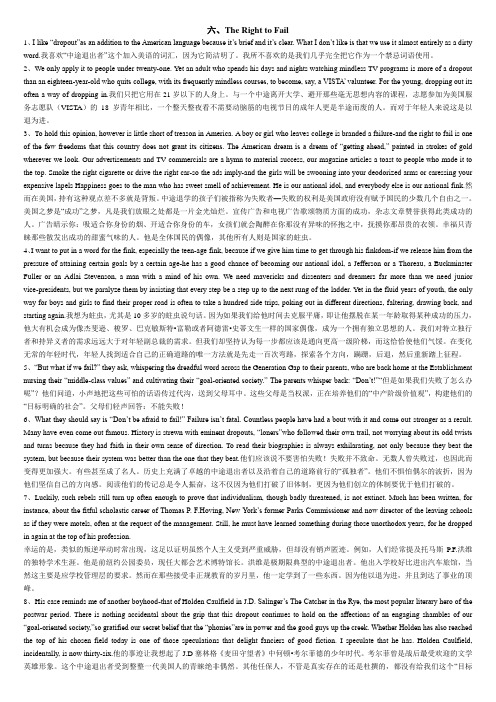
六、The Right to Fail1、I like ―dropout‖as an addition to the American language because it‘s brief and it‘s clear. What I don‘t like is that we use i t almost entirely as a dirty word.我喜欢―中途退出者‖这个加入美语的词汇,因为它简洁明了。
我所不喜欢的是我们几乎完全把它作为一个禁忌词语使用。
2、We only apply it to people under twenty-one. Yet an adult who spends his days and nights watching mindless TV programs is more of a dropout than an eighteen-year-old who quits college, with its frequently mindless courses, to become, say, a VISTA‘ valunteer. For the young, dropping out its often a way of dropping in.我们只把它用在21岁以下的人身上。
与一个中途离开大学、避开那些毫无思想内容的课程,志愿参加为美国服务志愿队(VISTA)的18岁青年相比,一个整天整夜看不需要动脑筋的电视节目的成年人更是半途而废的人。
而对于年轻人来说这是以退为进。
3、To hold this opinion, however is little short of treason in America. A boy or girl who leaves college is branded a failure-and the right to fail is one of the few freedoms that this country does not grant its citizens. The American dream is a dream of ―getting ahead,‖ painted in strokes of gold wherever we look. Our advertisements and TV commercials are a hymn to material success, our magazine articles a toast to people who made it to the top. Smoke the right cigarette or drive the right car-so the ads imply-and the girls will be swooning into your deodorized arms or caressing your expensive lapels Happiness goes to the man who has sweet smell of achievement. He is our national idol, and everybody else is our national fink.然而在美国,持有这种观点差不多就是背叛。
研究生英语阅读教程(基础级2版)课文01及其翻译

World English: A Blessing or a Curse? Universal languageBy Tom McArthur[1] In the year 2000, the language scholar Glanville Price, a Welshman, made the following assertion as editor of the book Languages in Britain and Ireland:For English is a killer. It is English that has killed off Cumbric, Cornish, Norn and Manx. There are still parts of these islands where sizeable communities speak languages that were there before English. Yet English is everywhere in everyday use and understood by all or virtually(actually) all, constituting such a threat to the three remaining Celtic languages, Irish, Scottish Gaelic, and Welsh... that their long-term future must be considered... very greatly at risk. (p 141) Some years earlier, in 1992, Robert Phillipson, English academic who currently (at the present/ at the moment) works in Denmark, published with Oxford a book entitled Linguistic Imperialism. In it, he argued that the major English-speaking countries, the worldwide English-language teaching industry, and notably (especially) the British Council pursue policies of linguistic aggrandisement. He also associated such policies with a prejudice which he calls linguicism[a condition parallel to(equal to/ similar to) racism and sexism]. As Phillipson sees it, leading institutions and individuals within the predominantly "white" English-speaking world, have [by design(=deliberately) or default(=mistake)] encouraged or at least tolerated—and certainly have not opposed—the hegemonic spread of English, a spread which began some (about) three centuries ago as (when) economic and colonial expansion.[2] Phillipson himself worked for some years for the British Council, and he is not alone among Anglophone academics who have sought to point up the dangers of English as a world language. The internationalization of English has in the last few decades been widely discussed in terms of three groups: first, the ENL countries, where English is a native language (this group also being known as the "inner circle"); second, the ESL countries, where English is a second language (the "outer circle"); and third, the EFL countries, where English is a foreign language (the "expanding circle"). Since the 1980s, when such terms became common, this third circle has in fact expanded to take in the entire planet.[3] For good or for ill, there has never been a language quite like English. There have been many "world languages", such as Arabic, Chinese, Greek, Latin, and Sanskrit. By and large, we now view them as more or less benign, and often talk with admiration and appreciation about the cultures associated with them and what they have given to the world. And it is fairly (very) safe to do this, because none of them now poses much of a threat.[4] English however is probably (perhaps) too close for us to be able to analyze and judge it as dispassionately (objectively), as we may now discuss the influence of Classical Chinese on East Asia or of Classical Latin on Western Europe. The jury is still out in the trial of the English language, and may take several centuries to produce its verdict, but even so we can ask, in this European Year of Languages, whether Price and Phillipson are right to warn us all about the language that I am using at this very moment. [warn sb. of sth.][5] It certainly isn't hard(difficult) to look for situations (examples) where people might call English a curse. An example is Australia, which is routinely regarded as a straightforward English-speaking country. The first Europeans who went there often used Latin to describe and discuss the place. The word Australia itself is Latin; evidently (Obviously/ Apparently) no one at the time thought of simply calling it "Southland" (which is what Australia means). In addition(besides), in South Australia there is a wide stretch of land called the Nullarbor Plains, the first word of which sounds Aboriginal, but nullarbor is Latin and means "no trees". And most significantly of all, the early settlers called the continent a terra nullius. According to the Encarta World English Dictionary (1999) the Latin phrase terra nullius means:... the idea and legal concept that when the first Europeans arrived in Australia the land was owned by no one and therefore open to settlement. It has been judged not to be legally valid.But that judgment was made only recently. When the Europeans arrived, Australia was thinly populated—but populated nonetheless (from then on)—from coast to coast in every direction. There were hundreds of communities and languages. Many of these languages have died out, many more are in the process of dying out, and these dead and dying languages have been largely replaced (substituted) by either kinds of pidgin English or general Australian English. Depending on your point of view, this is either a tragic loss or the price of progress.[6] At the same time, however, can the blame for the extinction of Aboriginal languages be laid specifically at the door of English? The first Europeans to discover Australia were Dutch, and their language might have become the language of colonization and settlement. Any settler language could have had the same effect. If for example the Mongols had sustained their vast Eurasian empire, Mongolian might have become a world language and gone to Australia. Again, if history had been somewhat (a little) different, today's world language might have been Arabic, a powerful language in West Asia and North Africa that currently affects many smaller languages, including Coptic and Berber. Spanish has adversely (negatively) affected indigenous languages in so-called "Latin" America, and Russian has spread from Europe to the Siberian Pacific. If English is a curse and a killer, it may only be so in the sense (meaning) that any large language is likely (possible) to influence and endanger smaller languages.[7] Yet many people see (consider/ regard) English as a blessing. Let me leave aside here the obvious advantages possessed by any world language, such as a large communicative network, a strong literary and media complex (network), and a powerful cultural and educational apparatus (organization). Let us instead look at something rather different: the issue (problem) of politics, justice, and equality. My object (target) lesson this time is South Africa. Ten years ago, South Africa ceased (stopped) to be governed on principles of racial separateness, a system known in Afrikaans (a language derived from Dutch) as apartheid. The system arose (occurred) because the Afrikaner community—European settlers of mainly Dutch descent—saw themselves as superior to the indigenous (native) people of the land they had colonized.[8] English-speaking South Africans of British descent were not particularly strong in opposing the apartheid regime (rule), and the black opposition, whose members had many languages, was at first weak and disorganized. However, the language through which this opposition gained (obtained/ got) strength and organization was English, which became for them the key language of freedom and unity, not of oppression. There are today eleven official languages in South Africa—English, Afrikaans, and nine vernacular languages that include Zulu, Ndebele, and Setswana. But which of these nine do black South Africans use (or plan to use) as their national lingua franca? Which do they wish their children to speak and write successfully (in addition to their mother tongues)? The answer is none of the above. They want English, and in particular (especially/ specifically) they want a suitably Africanized English.[9] So, a curse for the indigenous peoples of Australia and something of a blessing for those in South Africa...[10] How then should we think of English in our globalizing world with its endangered diversities? The answer, it seems to me, is crystal clear. Like many things, English is at times (often) a blessing and at times a curse—for individuals, for communities (society), for nations, and even for unions of nations. The East Asian symbolism of yin and yang might serve (illustrate) well here: There is something of yang in every yin, of yin in every yang. Although they are opposites, they belong together: in this instance (case) within the circle of communication. Such symbolism suggests (shows) that the users of the world's lingua franca should seek to benefit as fully as possible from the blessing and as far as possible avoid invoking the curse. (1, 292 words)ABOUT THE AUTHORDr. Tom McArthur is founder editor of the Oxford Companion to the English Language (1992) and the quarterly English Today: The International Review of the English Language (Cambridge, 1985—). His more than 20 published works include the Longman Lexicon of Contemporary English (1981), Worlds of Reference: Language, Lexicography and Learning from the Clay Tablet to the Computer (1986), and The English Languages (1998). He is currently Deputy Director of the Dictionary Research Center at the University of Exeter.EXERCISESI. Reading ComprehensionAnswer the following questions or complete the, following statements.1. It can be inferred from Glanville Price's statement that he is ______.A. happy that English is everywhere in Britain and IrelandB. worried about the future of the remaining Celtic languagesC. shocked by the diversity of languages in Britain and IrelandD. amazed that many people in the UK still speak their Aboriginal languages2. Cumbric is used as an example of ______.A. a local dialectB. a victim of the English languageC. a language that is on the verge of extinctionD. a language that is used by only a limited number of people3. Which of the following is the major concern of the book Linguistic Imperialism?A. English teaching overseas.B. British government's language policies.C. Dominance of English over other languages.D. The role of English in technology advancement.4. Both Price and Phillipson are ______.A. government officialsB. advocates of linguistic imperialismC. in support of language policies carried out by the British CouncilD. concerned about the negative effect of English on smaller languages5. According to the text, the EFL countries ______.A. are large in numberB. is known as the "outer circle"C. will be endangered by EnglishD. have made English their official language6. According to McArthur, Chinese is different from English in that ______.A. it has made a great contribution to the worldB. it has had positive influence on other languagesC. it may result in the disappearance of other languagesD. it probably will not endanger the existence of other languages7. When he said the jury is out in the trial" (Line 3, Paragraph 4), McArthur meant ______.A. punishment is dueB. the jury is waiting for a trialC. no decision has been made yetD. there is no one to make the decision8. Australia might be used as an example to show that ______.A. languages are changing all the timeB. some English words are derived from LatinC. English has promoted the progress of some nationsD. English should be blamed for the extinction of smaller languages9. Many people see English as a blessing for people in ______.A. AustraliaB. East AsiaC. South AfricaD. ESL countries10. The main theme of this speech is that ______.A. English should be taught worldwideB. English as a world language does more harm than goodC. we should be objective to the internationalization of EnglishD. we should be aware of (realize) the danger of English as a world languageB. Questions on global understanding and logical structures1. Why does McArthur introduce Glanville Price and Robert Phillipson's points of view on the spread of English? What is his? Intention?McArthur quotes Price’s assertion and cites Pillipson’s viewpoint on the spread of English as sort of cons to initiate his argument. Cons are usually popularly believed arguments or opinions that are against the author’s point of view. Cons are c ommonly used writing techniques and are often employed in order to appeal the audience and highlight the author’sviewpoint.2. Does McArthur agree with what Price and Phillipson argued? From as early as which section does McArthur show his attitude? Toward the dominance of English as a world English?No. McArthur’s opinion is different from Price and Pillipson’s arguments. He doesn’t believe that English is a killer and should be blamed for the extinction of smaller languages. He sees English as both a blessing and a curse, maybe as a blessing more than a curse. After introducing Price and Pillipson’s viewpoints, McArthur writes about his own ideas on the issue of English as a world language. From the sentence “For good or for ill, there has never been a language quite like English”, we can learn that McArthur does not curse English like Price and Pillipson and he has a different point of view.3. By reading "It certainly isn't hard to look for situations where people might call English a curse", could we conclude that McArthur believes English is a curse?No. This sentence is a kind of justification. Although McArthur literally justifies the fact that there are situations where people might call English a curse, he doesn’t believe that English is virtua lly a curse. By adding the word “certainly” McArthur shows his intent.4. Could you pick up some words and expressions that signal change or continuation in McArthur's thought?“For good or for ill”(paragraph 3) /“however”(paragraph 4) /“But”(paragraph 5) / “At the same time, however”(paragraph 6) /“Yet”(paragraph 7)5. How many parts can this speech be divided? How are the parts organized?Part One: paragraphs 1 and 2. These two paragraphs introduce the situation that many academics argue against English as a world language.Part Two: paragraphs 3, 4, 5, 6, 7, 8, and 9. Paragraph three is a transitional paragraph that initiates McArthur’s own argument. In these paragraphs McArthur argues that English is not only a curse as many people have believed, but a blessing as well.Part Three: paragraph 10. McArthur concludes in the last paragraph that English may be a curse or a blessing depends on different situations and we should make advantages of world languages and avoid their disadvantages.II. VocabularyA. Choose the best word from the four choices to complete each of the following sentences.1. There has been much opposition from some social groups, ______ from the farming community.A. straightforwardlyB. notably(especially)C. virtuallyD. exceptionally2. The ______ view in Britain and other Western countries associates aging with decline, dependency, isolation, and often poverty (property).A. predominantB. credulousC. inclusive(<->exclusive)D. sustainable3. But gifts such as these cannot be awarded to everybody, either by judges or by the most ___ of governments./ reward rewarding [a gifted / talented person]A. toughB. demandingC. diverseD. benign (kind)4. The foreman read the ______ of guilty fourteen times, one for each defendant.A. prejudiceB. verificationC. verdictD. punishment5. They fear it could have a(n) ______ effect on global financial markets.A. sizeableB. adverse(negative)C. beneficialD. consequential6. The UN threatened to ______ economic sanctions if the talks were broken off.A. engageB. pursueC. abandon/ abundantD. invoke7. There are at least four crucial differences between the new ______ and the old government.A. regimeB. hegemonyC. complexD. federation/ fedal<->federal, confederate)8. These questions ______ a challenge to established attitude of superiority toward the outside world.A. evolveB. constituteC. tolerateD. aroused9. Because of this, a strong administrative ______ was needed to plan the use of scarce resources, organize production and regulate distribution.A. apparatusB. constitutionC. insistenceD. promotion10. I learnt that there are no genuinely ______ animals in this area, all the animals were brought here from other places.A. endangeredB. domesticated (tamed)C. indigenousD. extinctB. Choose the hest word or expression from the list given for each Honk Use each word or expression only once and make proper changes where necessary.point up by and large take in descent for good or illleave aside crystal clear die out endanger lay... at the door of1. The book concludes with a review of the possible impact (influence) of more intimate computers for good or ill, in various areas of human life.2. Moreover, it had become clear from the opinion polls that the unpopularity of the new tax was being laid at the door of the government which had introduced it, rather than the local authorities who were responsible for levying and collecting it.3. This case gave the example of breaking someone's arm: that is a really serious injury, but one which is unlikely to endanger the victim's life.4. Many of those who hold it live in poor areas and some are Colored, that is (=i.e./ namely), of mixed European and African descent.5. This debate is important because that "the facts" are notof the conversations follow a well-worn route from one topic to the next and back again, taking in most of human life. [worn-out]7. But since agriculture forms the basis (base) of our industry, it was, by and large (on the whole), also an intensification of the crisis in the national economy in general.8. Let us factors such as education, career structure, pay and9. It is true that the exact nature of this issue is uncertain. However, one thing is crystal clear: it will not endanger the planet and its inhabitants. (habitat)10. But if animal populations are too small, then they simply die out.III. ClozeThere are ten blanks in the following passage. Read the passage carefully and choose the best answer from the four choices given for each blank. [(criterion) criteria: (1)semantic/(2)grammatical]A simplified form of the English language based on 850 key words was developed in the late 1920s by the English psychologist Charles Kay Ogden and 1 by the English educator I. A. Richards. Known as Basic English, it was used mainly to teach English to non-English-speaking persons and 2 as an international language. The complexities of English spelling and grammar, however, were major 3 to the adoption of Basic English as a second language.The fundamental principle of Basic English was that any idea, 4 complex, may be reduced to simple units of thought and expressed clearly by a limited number of everyday words. The 850-word primary vocabulary was 5 600 nouns (representing things or events), 150 adjectives (for qualities and _ 6 ), and 100 general "operational" words, mainly verbs and prepositions. Almost all the words were in 7 use in English-speaking countries. More than 60 percent of them were one-syllable words. The basic vocabulary was created 8 by eliminating numerous words which have the same or similar meanings and by 9 the use of 18 "basic" verbs, such as make, get, do, have, and be. These verbs were generally combined with prepositions, such as up, among, under, in, and forward. For example, a Basic English student would use the expression “go up”10 "ascend".1. A. created B. publicized C. invented D. operated2. A. proved B. provided C. projected D. promoted3. A. advantages B. objections C. obstacles D. facileties4. A. however B. whatever C. wherever D. whenever5. A. comprised of B. made of C. composed of D. constituted of6. A. personalities B. properties C. preferences D. perceptions/ perceive)7. A. common B. ordinary C. average D. nonprofessional8. A. in all B. at times C. for good D. in part/ partially)9. A. experiencing B. exchanging C. excluding D. extending10. A. in spite of =despite B. in favor of C. instead of D. in case ofII. TranslationPut the following passages into Chinese.1. For English is a killer. It is English that has killed off Cumbric, Cornish, Norn and Manx. There are still parts of these islands where sizeable communities speak languages that were there before English. Yet English is everywhere in everyday use and understood by all or virtually all, constituting such a threat to the three remaining Celtic languages, Irish, Scottish Gaelic, and Welsh... that their long-term future must be considered... very greatly at risk.因为英语是个杀手。
新世纪研究生公共英语教材阅读A 课文翻译

Unit1一个小男孩的梦想马克吐温1 我小的时候,我们那密西西比河西岸的村镇上,玩伴们都只有一个水恒的志愿。
那就是当轮船上的水手.我们也有其他种种暂时的愿望,可是那都只是暂时性的、马戏团来到的时候和走了之后,总是使我们大家都燃起火热的希望,想当小又第一次到我们那带地方来的黑人游唱团使我们渴望着想试一试那种生活。
我们不时还有一种希望,那就是,如果我们活在世上。
品行挺好,上帝就会让我们当海盗。
这些愿望,一个一个地都先后幻灭了;可是想当轮船上的水手这种志愿却始终保持下来了。
2一艘简陋而外表华丽的定班轮船从圣路易斯开上来,另一艘从奇阿库克往下游开,每天都要来到这里一次。
在这些大事出现之前;这一天使人充满了期望,显得光辉灿烂;这些大事过了之后,时光就变得死气沉沉,空空洞洞了.不仅孩子们有这种感觉,整个村镇都是一样、如今事隔多年,我仍旧能在C中描绘往日的情景,完全像当时那样:夏天早晨,白色的村镇在阳光中打响街上是空荡荡的,几乎一个人都没有;水街的杂货铺前面坐着一两个店员,他们把那木条椅面的椅子翘起来靠在墙上,下巴顶在胸前,帽子垂下这着脸;打着瞌睡——他们身边有许多削木瓦的碎片,这就说明是什么事情把他们累坏了;一只母猪和一窝猪仔在人行道上闲荡着,痛痛快快地啃着西瓜皮和瓜子;两三个孤零零的小货物堆在“码头”上闲置着;石头铺的起卸码头的坡上有一堆“垫木”,镇上的流浪醉汉就在这木堆近旁酣睡着Z 码头上端有两三只平底木船;可是那拍打着这些船的小浪的柔和声响,却没有人倾听;伟大的密西西比河,壮丽、辉煌的密西西比河;让它那一荚里宽的洪流滚滚奔腾下去,在阳光中放出闪光;河对岸的远处是茂密的森林Z 村镇上游的“地角”和下游的“地角”截断了河上景色的视线。
把它变成了一片海面,而且这海面还是风光明媚、沉寂而幽静的。
随后有一股黑烟在远处的一个“地角”上空升腾起来;立刻就有一个以眼睛特别快、嗓子特别响出名的黑人运货马车夫高声喊道:“火——轮——船——来了!”于是情况就变了!镇上那个醉汉翻身起来,那几个店员也醒了;随后就是运货马车的一阵狂暴的响声,每厂人家和每个铺子里都涌出一股人流,转瞬之间,这个死气沉沉的村镇就热闹起来了、活动起来了。
大学英语阅读教程1课文翻译why are you going

大学英语阅读教程1课文翻译why are you going Why are you going north? You are going the wrong way!’怎么往北呢?你走错了!’"He said: `My horse is big and strong. It can run as fast as flying. It doesn't matter to run alittle more.' “他说:‘我的马很好,又高又大,跑起来跟飞一样快。
多跑点儿没关系。
’"I told him: `Though your horse is good, you are going in the wrong direction.'“我告诉他:‘你的马虽然好,可是去楚国的方向不对呀!"He said: `It doesn't matter. I have lots of money.'“他说:‘没关系,我有很多钱。
’"I told him again: `Though you have lots of money, this is not the road to the State of Chu.'“我又告诉他:‘你钱虽然多,但是这不是去楚国的路呀!’"He said: `It doesn't matter. My driver is good and strong.' “他说:‘没关系,我的车夫好,他身强力壮。
’"Finally I told him: `Though your driver is good and strong, this is not the road to the State ofChu."“最后我告诉他:‘你的车夫虽然好,但是这不是去楚国的路呀!' The King of Wei blurted out: "Alas, this man is too obstinate.魏王脱口说道:“唉!这个人真固执。
研究生科技英语阅读课文翻译(1-10).
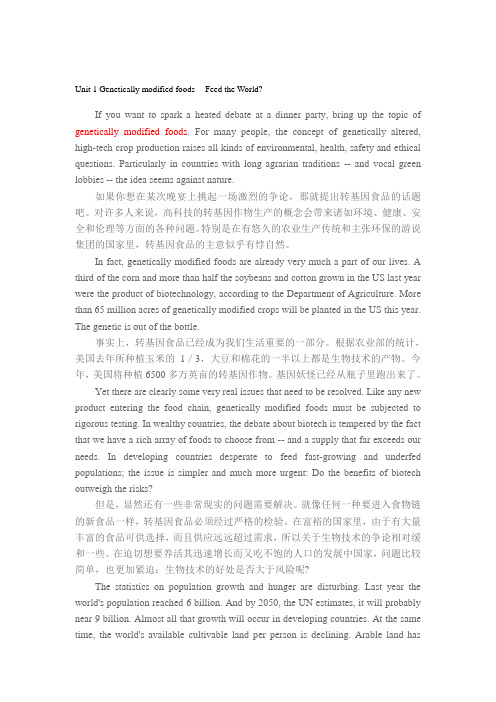
Unit 1 Genetically modified foods -- Feed the World?If you want to spark a heated debate at a dinner party, bring up the topic of genetically modified foods. For many people, the concept of genetically altered, high-tech crop production raises all kinds of environmental, health, safety and ethical questions. Particularly in countries with long agrarian traditions -- and vocal green lobbies -- the idea seems against nature.如果你想在某次晚宴上挑起一场激烈的争论,那就提出转基因食品的话题吧。
对许多人来说,高科技的转基因作物生产的概念会带来诸如环境、健康、安全和伦理等方面的各种问题。
特别是在有悠久的农业生产传统和主张环保的游说集团的国家里,转基因食品的主意似乎有悖自然。
In fact, genetically modified foods are already very much a part of our lives. A third of the corn and more than half the soybeans and cotton grown in the US last year were the product of biotechnology, according to the Department of Agriculture. More than 65 million acres of genetically modified crops will be planted in the US this year. The genetic is out of the bottle.事实上,转基因食品已经成为我们生活重要的一部分。
大学英语精读1课文翻译全
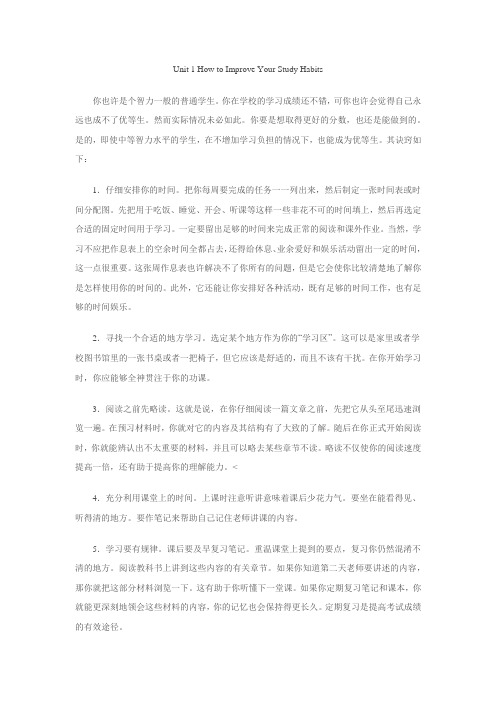
Unit 1 How to Improve Your Study Habits你也许是个智力一般的普通学生。
你在学校的学习成绩还不错,可你也许会觉得自己永远也成不了优等生。
然而实际情况未必如此。
你要是想取得更好的分数,也还是能做到的。
是的,即使中等智力水平的学生,在不增加学习负担的情况下,也能成为优等生。
其诀窍如下:1.仔细安排你的时间。
把你每周要完成的任务一一列出来,然后制定一张时间表或时间分配图。
先把用于吃饭、睡觉、开会、听课等这样一些非花不可的时间填上,然后再选定合适的固定时间用于学习。
一定要留出足够的时间来完成正常的阅读和课外作业。
当然,学习不应把作息表上的空余时间全都占去,还得给休息、业余爱好和娱乐活动留出一定的时间,这一点很重要。
这张周作息表也许解决不了你所有的问题,但是它会使你比较清楚地了解你是怎样使用你的时间的。
此外,它还能让你安排好各种活动,既有足够的时间工作,也有足够的时间娱乐。
2.寻找一个合适的地方学习。
选定某个地方作为你的“学习区”。
这可以是家里或者学校图书馆里的一张书桌或者一把椅子,但它应该是舒适的,而且不该有干扰。
在你开始学习时,你应能够全神贯注于你的功课。
3.阅读之前先略读。
这就是说,在你仔细阅读一篇文章之前,先把它从头至尾迅速浏览一遍。
在预习材料时,你就对它的内容及其结构有了大致的了解。
随后在你正式开始阅读时,你就能辨认出不太重要的材料,并且可以略去某些章节不读。
略读不仅使你的阅读速度提高一倍,还有助于提高你的理解能力。
<4.充分利用课堂上的时间。
上课时注意听讲意味着课后少花力气。
要坐在能看得见、听得清的地方。
要作笔记来帮助自己记住老师讲课的内容。
5.学习要有规律。
课后要及早复习笔记。
重温课堂上提到的要点,复习你仍然混淆不清的地方。
阅读教科书上讲到这些内容的有关章节。
如果你知道第二天老师要讲述的内容,那你就把这部分材料浏览一下。
这有助于你听懂下一堂课。
如果你定期复习笔记和课本,你就能更深刻地领会这些材料的内容,你的记忆也会保持得更长久。
自考_英语阅读(一)_0595第二单元_课文及翻译
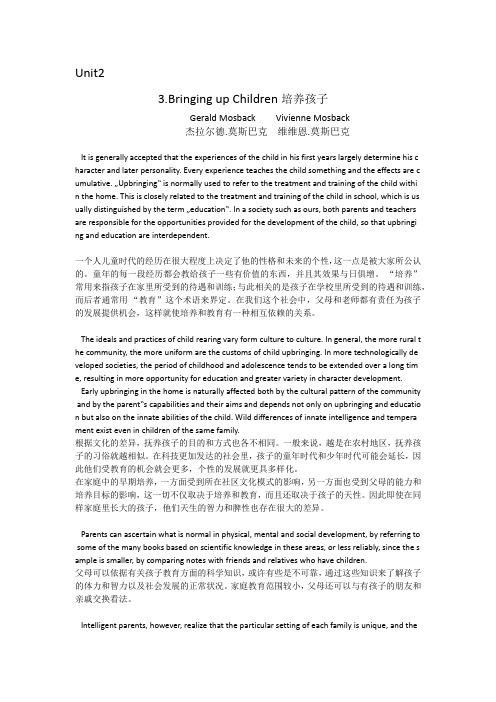
Unit23.Bringing up Children培养孩子Gerald Mosback Vivienne Mosback杰拉尔德.莫斯巴克维维恩.莫斯巴克It is generally accepted that the experiences of the child in his first years largely determine his c haracter and later personality. Every experience teaches the child something and the effects are c umulative. …Upbringing‟ is normally used to refer to the treatment and training of the child within the home. This is closely related to the treatment and training of the child in school, which is us ually distinguished by the term …education‟. In a society such as ours, both parents and teachers are responsible for the opportunities provided for the development of the child, so that upbringing and education are interdependent.一个人儿童时代的经历在很大程度上决定了他的性格和未来的个性,这一点是被大家所公认的。
童年的每一段经历都会教给孩子一些有价值的东西,并且其效果与日俱增。
“培养”常用来指孩子在家里所受到的待遇和训练;与此相关的是孩子在学校里所受到的待遇和训练,而后者通常用“教育”这个术语来界定。
人教版九年级英语课文翻译
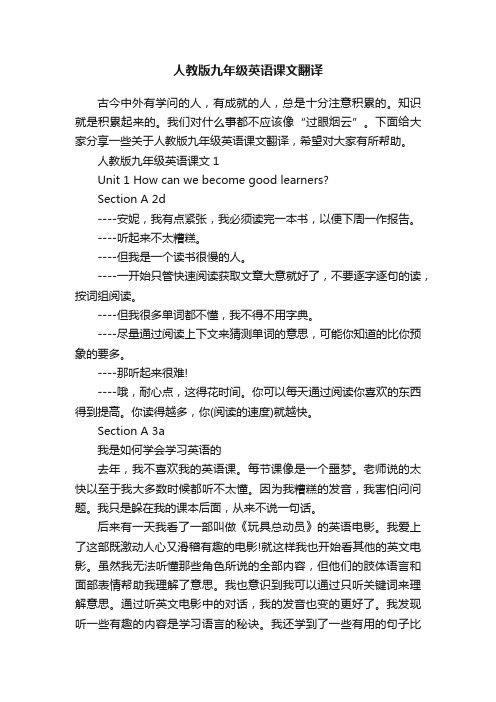
人教版九年级英语课文翻译古今中外有学问的人,有成就的人,总是十分注意积累的。
知识就是积累起来的。
我们对什么事都不应该像“过眼烟云”。
下面给大家分享一些关于人教版九年级英语课文翻译,希望对大家有所帮助。
人教版九年级英语课文1Unit 1 How can we become good learners?Section A 2d----安妮,我有点紧张,我必须读完一本书,以便下周一作报告。
----听起来不太糟糕。
----但我是一个读书很慢的人。
----一开始只管快速阅读获取文章大意就好了,不要逐字逐句的读,按词组阅读。
----但我很多单词都不懂,我不得不用字典。
----尽量通过阅读上下文来猜测单词的意思,可能你知道的比你预象的要多。
----那听起来很难!----哦,耐心点,这得花时间。
你可以每天通过阅读你喜欢的东西得到提高。
你读得越多,你(阅读的速度)就越快。
Section A 3a我是如何学会学习英语的去年,我不喜欢我的英语课。
每节课像是一个噩梦。
老师说的太快以至于我大多数时候都听不太懂。
因为我糟糕的发音,我害怕问问题。
我只是躲在我的课本后面,从来不说一句话。
后来有一天我看了一部叫做《玩具总动员》的英语电影。
我爱上了这部既激动人心又滑稽有趣的电影!就这样我也开始看其他的英文电影。
虽然我无法听懂那些角色所说的全部内容,但他们的肢体语言和面部表情帮助我理解了意思。
我也意识到我可以通过只听关键词来理解意思。
通过听英文电影中的对话,我的发音也变的更好了。
我发现听一些有趣的内容是学习语言的秘诀。
我还学到了一些有用的句子比如“这简直是小菜一碟”或者“你活该”。
我起初不理解这些句子,但是因为我想理解这个故事,所以我查了字典。
现在我真的喜欢我的英语课。
我想学习生词和更多的语法,那样我对英语电影就能有更好的理解了。
Section B 2b怎么成为一个成功的学习者呢?每个人天生就拥有学习的能力。
但是你能否学习的好取决于你的学习习惯。
英语阅读一课文翻译

一天的等待他走进我们的房间关窗户的时候,我们还未起床。
我见他一副病容,全身哆嗦,脸色苍白,步履缓慢,好像一动就会引起疼痛。
“你怎么啦,宝贝?”“我头痛。
”“你最好回去睡觉”“不,我没啥病。
”“你先去睡。
我穿好衣服来看你”可是当我来到楼下时,他已穿好衣服,坐在火炉旁。
这个九岁的男孩,看上去病的厉害,一副可怜的模样。
我用手摸了摸他的额头,知道他发烧了。
“你到楼上去睡,”我说,“你病了”“我没有病”他说医生来后,最了孩子的体温。
“多少度”我问医生。
“一百零二度”下楼后,医生留下用不同颜色胶囊包装的三种药丸,并嘱咐如何服用。
一种药退烧,另一种润肠,通便,还有一种是去酸。
他解释说,流感细菌只能在酸性环境中生存。
他似乎对流感很内行,并说,如果发烧不超过一百零四度,就用不着担心。
这是轻度流感,只要当心不引起肺炎,就无危险。
我回到房里,记下孩子的体温,并记下各种胶囊的服用时间。
要不要让我读点书给你听好的,如果你想读的话,孩子说,他的脸色十分苍白,眼窝下方有黑晕,他躺在床上一动不动。
对周围发生的一切漠然置之。
我朗读霍华德派尔的海盗故事,但我看得出他并不在听。
你感觉怎么样,宝贝?我问他到目前为止,还是老样子,他说我坐在床脚旁自个儿看书,等着到时间再给他服一粒药丸。
按理,他本该睡着了。
然而,当我抬头看时,他却双眼盯着床脚,神情异常。
你为什么不睡一会儿呢?到吃药时,我会叫醒你的,我宁愿醒着。
过了一会儿,他对我说,你不必呆在这时陪我,爸爸,要是这事令你烦恼的话。
没有什么可烦恼的。
不,我是说,要是这事终将给你带来烦恼的话,你就不必呆在这里。
我想,或许他有点神志不清了。
十一点钟,照规定给他服药后,我便出去了一会儿。
那是个晴朗而又寒冷的日子,地上覆盖着一层已结成冰的冻雨,就像那光秃秃的树木,那灌木丛,那砍下的树枝,以及所有的草坪和空地都用冰漆过似的,我带着我那条幼小的爱尔兰猎犬,沿着大路和一冰冻的小溪散步。
但在这玻璃般平滑的地面上站立和行走是很困难的。
英语阅读一课文句子翻译

英语阅读(一)课文句子翻译1. A Day’s Wait 一天的等待1、He came into the room to shut the windows while we were still in bedand I saw he looked ill. He was shivering, his face was white, and he walked slowly as though it ached to move.他走进我们房间关窗户的时候,我们还未起床。
我见他一副病容,全身哆嗦,脸色苍白,步履缓慢,好象一动就会引起疼痛。
2、But when I came downstairs he was dressed, sitting by the fire, lookinga very sick and miserable boy of nine years. When I put my hand on hisforehead I knew had a fever.可是当我来到楼下时,他已穿好衣服,坐在火炉旁。
这个九岁的男孩,看上去病得厉害,一副可怜的模样。
我用手摸了摸他的额头,知道他发烧了。
3、“All right. If you want to,” said the boy. His face was very white andthere were dark areas under his eyes. He lay still in the bed and seemed very detached from what was going on.“好的,如果你想读的话,” 孩子说。
他的脸色十分苍白,眼窝下方有黑晕。
他躺在床上一动不动,对周围发生的一切漠然置之。
3. Bringing up Children培养孩子1、It is generally accepted that the experiences of the child in his first years largely determine his character and later personality.一个人儿童时代的经历在很大程度上决定了他的性格和未来的个性,这一点是被大家所公认的。
研究生英语阅读教程(基础级第二版)1-10课文及课后习题答案翻译
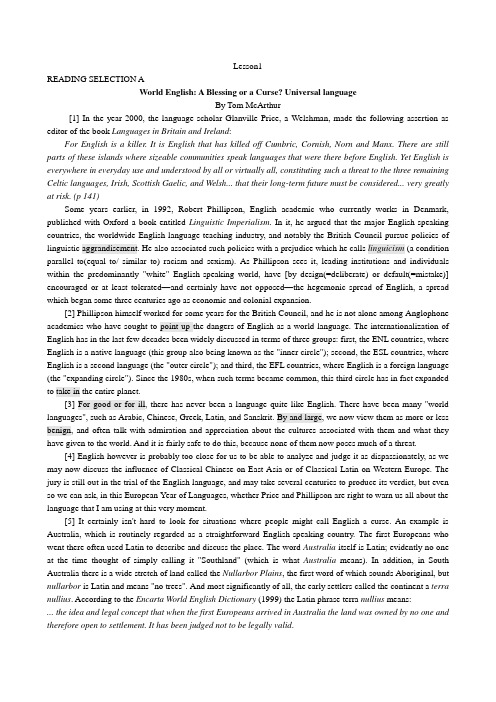
Lesson1READING SELECTION AWorld English: A Blessing or a Curse? Universal languageBy Tom McArthur[1] In the year 2000, the language scholar Glanville Price, a Welshman, made the following assertion as editor of the book Languages in Britain and Ireland:For English is a killer. It is English that has killed off Cumbric, Cornish, Norn and Manx. There are still parts of these islands where sizeable communities speak languages that were there before English. Yet English is everywhere in everyday use and understood by all or virtually all, constituting such a threat to the three remaining Celtic languages, Irish, Scottish Gaelic, and Welsh... that their long-term future must be considered... very greatly at risk. (p 141)Some years earlier, in 1992, Robert Phillipson, English academic who currently works in Denmark, published with Oxford a book entitled Linguistic Imperialism. In it, he argued that the major English-speaking countries, the worldwide English-language teaching industry, and notably the British Council pursue policies of linguistic aggrandisement. He also associated such policies with a prejudice which he calls linguicism (a condition parallel to(equal to/ similar to) racism and sexism). As Phillipson sees it, leading institutions and individuals within the predominantly "white" English-speaking world, have [by design(=deliberate) or default(=mistake)] encouraged or at least tolerated—and certainly have not opposed—the hegemonic spread of English, a spread which began some three centuries ago as economic and colonial expansion.[2] Phillipson himself worked for some years for the British Council, and he is not alone among Anglophone academics who have sought to point up the dangers of English as a world language. The internationalization of English has in the last few decades been widely discussed in terms of three groups: first, the ENL countries, where English is a native language (this group also being known as the "inner circle"); second, the ESL countries, where English is a second language (the "outer circle"); and third, the EFL countries, where English is a foreign language (the "expanding circle"). Since the 1980s, when such terms became common, this third circle has in fact expanded to take in the entire planet.[3] For good or for ill, there has never been a language quite like English. There have been many "world languages", such as Arabic, Chinese, Greek, Latin, and Sanskrit. By and large, we now view them as more or less benign, and often talk with admiration and appreciation about the cultures associated with them and what they have given to the world. And it is fairly safe to do this, because none of them now poses much of a threat.[4] English however is probably too close for us to be able to analyze and judge it as dispassionately, as we may now discuss the influence of Classical Chinese on East Asia or of Classical Latin on Western Europe. The jury is still out in the trial of the English language, and may take several centuries to produce its verdict, but even so we can ask, in this European Year of Languages, whether Price and Phillipson are right to warn us all about the language that I am using at this very moment.[5] It certainly isn't hard to look for situations where people might call English a curse. An example is Australia, which is routinely regarded as a straightforward English-speaking country. The first Europeans who went there often used Latin to describe and discuss the place. The word Australia itself is Latin; evidently no one at the time thought of simply calling it "Southland" (which is what Australia means). In addition, in South Australia there is a wide stretch of land called the Nullarbor Plains, the first word of which sounds Aboriginal, but nullarbor is Latin and means "no trees". And most significantly of all, the early settlers called the continent a terra nullius. According to the Encarta World English Dictionary (1999) the Latin phrase terra nullius means:... the idea and legal concept that when the first Europeans arrived in Australia the land was owned by no one and therefore open to settlement. It has been judged not to be legally valid.But that judgment was made only recently. When the Europeans arrived, Australia was thinly populated—but populated nonetheless—from coast to coast in every direction. There were hundreds of communities and languages. Many of these languages have died out, many more are in the process of dying out, and these dead and dying languages have been largely replaced by either kinds of pidgin English or general Australian English. Depending on your point of view, this is either a tragic loss or the price of progress.[6] At the same time, however, can the blame for the extinction of Aboriginal languages be laid specifically at the door of English? The first Europeans to discover Australia were Dutch, and their language might have become the language of colonization and settlement. Any settler language could have had the same effect. If for example the Mongols had sustained their vast Eurasian empire, Mongolian might have become a world language and gone to Australia. Again, if history had been somewhat different, today's world language might have been Arabic, a powerful language in West Asia and North Africa that currently affects many smaller languages, including Coptic and Berber. Spanish has adversely affected indigenous languages in so-called "Latin" America, and Russian has spread from Europe to the Siberian Pacific. If English is a curse and a killer, it may only be so in the sense that any large language is likely to influence and endanger smaller languages.[7] Yet many people see English as a blessing. Let me leave aside here the obvious advantages possessed by any world language, such as a large communicative network, a strong literary and media complex, and a powerful cultural and educational apparatus. Let us instead look at something rather different: the issue of politics, justice, and equality. My object lesson this time is South Africa. Ten years ago, South Africa ceased to be governed on principles of racial separateness, a system known in Afrikaans (a language derived from Dutch) as apartheid. The system arose because the Afrikaner community—European settlers of mainly Dutch descent—saw themselves as superior to the indigenous people of the land they had colonized.[8] English-speaking South Africans of British descent were not particularly strong in opposing the apartheid regime, and the black opposition, whose members had many languages, was at first weak and disorganized. However, the language through which this opposition gained strength and organization was English, which became for them the key language of freedom and unity, not of oppression. There are today eleven official languages in South Africa—English, Afrikaans, and nine vernacular languages that include Zulu, Ndebele, and Setswana. But which of these nine do black South Africans use (or plan to use) as their national lingua franca? Which do they wish their children to speak and write successfully (in addition to their mother tongues)? The answer is none of the above. They want English, and in particular they want a suitably Africanized English.[9] So, a curse for the indigenous peoples of Australia and something of a blessing for those in South Africa...[10] How then should we think of English in our globalizing world with its endangered diversities? The answer, it seems to me, is crystal clear. Like many things, English is at times a blessing and at times a curse—for individuals, for communities, for nations, and even for unions of nations. The East Asian symbolism of yin and yang might serve well here: There is something of yang in every yin, of yin in every yang. Although they are opposites, they belong together: in this instance within the circle of communication. Such symbolism suggests that the users of the world's lingua franca should seek to benefit as fully as possible from the blessing and as far as possible avoid invoking the curse. (1, 292 words)ABOUT THE AUTHORDr. Tom McArthur is founder editor of the Oxford Companion to the English Language(1992) and the quarterly English Today: The International Review of the English Language (Cambridge, 1985— ). His more than 20 published works include the Longman Lexicon of Contemporary English(1981), Worlds of Reference: Language, Lexicography and Learning from the Clay Tablet to the Computer (1986), and The English Languages (1998). He is currently Deputy Director of the Dictionary Research Center at the University of Exeter.EXERCISESI. Reading ComprehensionAnswer the following questions or complete the, following statements.1. It can be inferred from Glanville Price's statement that he is ______.A. happy that English is everywhere in Britain and IrelandB. worried about the future of the remaining Celtic languagesC. shocked by the diversity of languages in Britain and IrelandD. amazed that many people in the UK still speak their Aboriginal languages2. Cumbric is used as an example of ______.A. a local dialectB. a victim of the English languageC. a language that is on the verge of extinctionD. a language that is used by only a limited number of people3. Which of the following is the major concern of the book Linguistic Imperialism?A. English teaching overseas.B. British government's language policies.C. Dominance of English over other languages.D. The role of English in technology advancement.4. Both Price and Phillipson are ______.A. government officialsB. advocates of linguistic imperialismC. in support of language policies carried out by the British CouncilD. concerned about the negative effect of English on smaller languages5. According to the text, the EFL countries ______.A. are large in numberB. is known as the "outer circle"C. will be endangered by EnglishD. have made English their official language6. According to McArthur, Chinese is different from English in that ______.A. it has made a great contribution to the worldB. it has had positive influence on other languagesC. it may result in the disappearance of other languagesD. it probably will not endanger the existence of other languages7. When he said the jury is out in the trial" (Line 3, Paragraph 4), McArthur meant ______.A. punishment is dueB. the jury is waiting for a trialC. no decision has been made yetD. there is no one to make the decision8. Australia might be used as an example to show that ______.A. languages are changing all the timeB. some English words are derived from LatinC. English has promoted the progress of some nationsD. English should be blamed for the extinction of smaller languages9. Many people see English as a blessing for people in ______.A. AustraliaB. East AsiaC. South AfricaD. ESL countries10. The main theme of this speech is that ______.A. English should be taught worldwideB. English as a world language does more harm than goodC. we should be objective to the internationalization of EnglishD. we should be aware of (realize) the danger of English as a world languageB. Questions on global understanding and logical structures1. Why does McArthur introduce Glanville Price and Robert Phillipson's points of view on the spread of English? What is his? Intention?McArthur quotes Price’s assertion and cites Pillipson’s viewpoint on the spread of English as sort of cons to initiate his argument. Cons are usually popularly believed arguments or opinions that are against the author’s point of view. Cons are commonly used writing techniques and are often employed in order to appeal the audience and highlight the author’sviewpoint.2. Does McArthur agree with what Price and Phillipson argued? From as early as which section does McArthur show his attitude? Toward the dominance of English as a world English?No. McArthur’s opinion is different from Price and Pillipson’s arguments. He doesn’t believe that English is a killer and should be blamed for the extinction of smaller languages. He sees English as both a blessing and a curse, maybe as a blessing more than a curse. After introducing Price and Pillipson’s viewpoints, McArthur writes about his own ideas on the iss ue of English as a world language. From the sentence “For good or for ill, there has never been a language quite like English”, we can learn that McArthur does not curse English like Price and Pillipson and he has a different point of view.3. By reading "It certainly isn't hard to look for situations where people might call English a curse", could we conclude that McArthur believes English is a curse?No. This sentence is a kind of justification. Although McArthur literally justifies the fact that there are situations where people might call English a curse, he doesn’t believe that English is virtually a curse. By adding the word “certainly” McArthur shows his intent.4. Could you pick up some words and expressions that signal change or continuation in McArthur's thought?“For good or for ill”(paragraph 3) /“however” (paragraph 4) /“But”(paragraph 5) / “At the same time,however”(paragraph 6) /“Yet”(paragraph 7)5. How many parts can this speech be divided? How are the parts organized?Part One: paragraphs 1 and 2. These two paragraphs introduce the situation that many academics argue against English as a world language.Part Two: paragraphs 3, 4, 5, 6, 7, 8, and 9. Paragraph three is a transitional paragraph that initiates McArthur’s own argument. In these paragraphs McArthur argues that English is not only a curse as many people have believed, but a blessing as well.Part Three: paragraph 10. McArthur concludes in the last paragraph that English may be a curse or a blessing depends on different situations and we should make advantages of world languages and avoid their disadvantages.II. VocabularyA. Choose the best word from the four choices to complete each of the following sentences.1. There has been much opposition from some social groups, ______ from the farming community.A. straightforwardlyB. notablyC. virtuallyD. exceptionally2. The ______ view in Britain and other Western countries associates aging with decline, dependency, isolation, and often poverty.A. predominantB. credulousC. inclusiveD. sustainable3. But gifts such as these cannot be awarded to everybody, either by judges or by the most ___ of governments./ reward rewardingA. toughB. demandingC. diverseD. benign4. The foreman read the ______ of guilty fourteen times, one for each defendant.A. prejudiceB. verificationC. verdictD. punishment5. They fear it could have a(n) ______ effect on global financial markets.A. sizeableB. adverse(negative)C. beneficialD. consequential6. The UN threatened to ______ economic sanctions if the talks were broken off.A. engageB. pursueC. abandon/ abundantD. invoke7. There are at least four crucial differences between the new ______ and the old government.A. regimeB. hegemonyC. complexD. federation/ fedal<->federal, confederate)8. These questions ______ a challenge to established attitude of superiority toward the outside world.A. evolveB. constituteC. tolerateD. aroused9. Because of this, a strong administrative ______ was needed to plan the use of scarce resources, organize production and regulate distribution.A. apparatusB. constitutionC. insistenceD. promotion10. I learnt that there are no genuinely ______ animals in this area, all the animals were brought here from other places.A. endangeredB. domesticatedC. indigenousD. extinctB. Choose the hest word or expression from the list given for each Honk Use each word or expression only once and make proper changes where necessary.point up by and large take in descent for good or illleave aside crystal clear die out endanger lay... at the door of1. The book concludes with a review of the possible impact (influence) of more intimate computers for good or ill, in various areas of human life.2. Moreover, it had become clear from the opinion polls that the unpopularity of the new tax was being laid at the door of the government which had introduced it, rather than the local authorities who were responsible for levying and collecting it.3. This case gave the example of breaking someone's arm: that is a really serious injury, but one which is unlikely to endanger the victim's life.4. Many of those who hold it live in poor areas and some are Colored, that is (i.e./ namely), of mixed European and African descent.5. This debate is important because it points up (stress/ emphasize) that "the facts" are not necessarily as simple and straightforward as they might at first sight seem.6. In the beginning, the meaning of life might be debated, but once past the first period, many of the conversations follow a well-worn route from one topic to the next and back again, taking in most of human life.7. But since agriculture forms the basis (base) of our industry, it was, by and large (on the whole), also an intensification of the crisis in the national economy in general.8. Let us leave aside other relevant factors such as education, career structure, pay and conditions of service and concentrate on (focus on) manpower management.(relate A to B)9. It is true that the exact nature of this issue is uncertain. However, one thing is crystal clear: it will not endanger the planet and its inhabitants.10. But if animal populations are too small, then they simply die out.III. ClozeThere are ten blanks in the following passage. Read the passage carefully and choose the best answer from the four choices given for each blank. [criteria: (1)semantic/ (2)grammatic]A simplified form of the English language based on 850 key words was developed in the late 1920s by the English psychologist Charles Kay Ogden and 1 by the English educator I. A. Richards. Known as Basic English, it was used mainly to teach English to non-English-speaking persons and 2 as an international language. The complexities of English spelling and grammar, however, were major 3 to the adoption of Basic English as a second language.The fundamental principle of Basic English was that any idea, 4 complex, may be reduced to simple units of thought and expressed clearly by a limited number of everyday words. The 850-word primary vocabulary was 5 600 nouns (representing things or events), 150 adjectives (for qualities and _ 6 ), and 100 general "operational" words, mainly verbs and prepositions. Almost all the words were in 7 use in English-speaking countries. More than 60 percent of them were one-syllable words. The basic vocabulary was created 8 by eliminating 9 the use of 18 "basic" verbs, such as make, get, do, have, and be.Numerous words which have the same or similar meanings and by verbs, such as make, get, do, have, and be. These verbs were generally combined with prepositions, such as up, among, under, in, and forward. For example,a Basic English student would use the expression “go up”10 "ascend". (Semantic / grammatical criterion)1. A. created B. publicized C. invented D. operated2. A. proved B. provided C. projected D. promoted3. A. advantages B. objections C. obstacles D. facileties4. A. however B. whatever C. wherever D. whenever5. A. comprised of B. made of C. composed of D. constituted of6. A. personalities B. properties C. preferences D. perceptions/ perceive)7. A. common B. ordinary C. average D. nonprofessional8. A. in all B. at times C. for good D. in part/ partially)9. A. experiencing B. exchanging C. excluding D. extending10. A. in spite of =despite B. in favor of C. instead of D. in case ofII. TranslationPut the following passages into Chinese.1. For English is a killer. It is English that has killed off Cumbric, Cornish, Norn and Manx. There are still parts of these islands where sizeable communities speak languages that were there before English. Yet English is everywhere in everyday use and understood by all or virtually all, constituting such a threat to the three remaining Celtic languages, Irish, Scottish Gaelic, and Welsh... that their long-term future must be considered... very greatly at risk.因为英语是个杀手。
现代大学英语精读1(带译文)

现代大学英语精读1(带译文)一、课文背景本单元选自美国作家埃德加·爱伦·坡的短篇小说《黑猫》。
故事讲述了一位酗酒成性的男子,因虐待并杀害自己收养的黑猫,最终被黑猫的鬼魂复仇,自己也在精神崩溃中走向毁灭。
这篇小说通过恐怖、悬疑的情节,揭示了人性的黑暗面和道德的沦丧。
二、课文概要1. 故事发生在美国一个偏远的农场,主人公是一位酗酒成性的男子。
他收养了一只黑猫,取名普卢托。
随着时间的推移,他对黑猫产生了强烈的依赖,甚至将它视为自己的朋友。
2. 有一天,男子在醉酒后用刀划伤了普卢托的左眼。
酒醒后,他为自己的行为感到愧疚,但为了掩盖罪行,他决定将黑猫埋在院子里。
3. 在黑猫被埋葬的当晚,男子听到了黑猫的哀嚎声。
他开始怀疑自己的行为,精神状态逐渐恶化。
4. 为了摆脱黑猫的纠缠,男子决定离开农场,搬到城里居住。
然而,他发现黑猫的鬼魂无处不在,甚至出现在他的新家中。
5. 最终,男子在精神崩溃中走向毁灭,被黑猫的鬼魂复仇。
三、课文难点解析1. 生词短语(1)酗酒成性:drunkard,意为“酒鬼”。
(2)虐待:torture,意为“折磨”。
(3)复仇:revenge,意为“报复”。
2. 句子结构(1)It was in the early part of the evening that I first became aware of the symptoms of my little trouble.本句中,It wasthat为强调句型,强调时间状语“in the early part of the evening”。
symptoms意为“症状”,指男子开始意识到自己的精神状态出现问题。
(2)I resolved to get rid of the cat at once.本句中,resolve to do sth. 意为“决定做某事”,get rid of意为“摆脱”。
男子决定立刻摆脱黑猫。
新编大学英语1-2册课文翻译
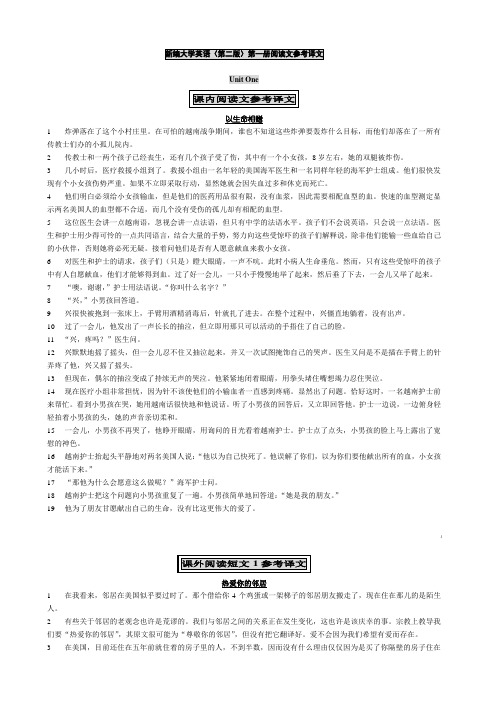
新编大学英语(第二版)第一册阅读文参考译文Unit One课内阅读文参考译文以生命相赠1 炸弹落在了这个小村庄里。
在可怕的越南战争期间,谁也不知道这些炸弹要轰炸什么目标,而他们却落在了一所有传教士们办的小孤儿院内。
2 传教士和一两个孩子已经丧生,还有几个孩子受了伤,其中有一个小女孩,8岁左右,她的双腿被炸伤。
3 几小时后,医疗救援小组到了。
救援小组由一名年轻的美国海军医生和一名同样年轻的海军护士组成。
他们很快发现有个小女孩伤势严重。
如果不立即采取行动,显然她就会因失血过多和休克而死亡。
4 他们明白必须给小女孩输血,但是他们的医药用品很有限,没有血浆,因此需要相配血型的血。
快速的血型测定显示两名美国人的血型都不合适,而几个没有受伤的孤儿却有相配的血型。
5 这位医生会讲一点越南语,忽视会讲一点法语,但只有中学的法语水平。
孩子们不会说英语,只会说一点法语。
医生和护士用少得可怜的一点共同语言,结合大量的手势,努力向这些受惊吓的孩子们解释说,除非他们能输一些血给自己的小伙伴,否则她将必死无疑。
接着问他们是否有人愿意献血来救小女孩。
6 对医生和护士的请求,孩子们(只是)瞪大眼睛,一声不吭。
此时小病人生命垂危。
然而,只有这些受惊吓的孩子中有人自愿献血,他们才能够得到血。
过了好一会儿,一只小手慢慢地举了起来,然后垂了下去,一会儿又举了起来。
7 “噢,谢谢,”护士用法语说。
“你叫什么名字?”8 “兴,”小男孩回答道。
9 兴很快被抱到一张床上,手臂用酒精消毒后,针就扎了进去。
在整个过程中,兴僵直地躺着,没有出声。
10 过了一会儿,他发出了一声长长的抽泣,但立即用那只可以活动的手捂住了自己的脸。
11 “兴,疼吗?”医生问。
12 兴默默地摇了摇头,但一会儿忍不住又抽泣起来,并又一次试图掩饰自己的哭声。
医生又问是不是插在手臂上的针弄疼了他,兴又摇了摇头。
13 但现在,偶尔的抽泣变成了持续无声的哭泣。
他紧紧地闭着眼睛,用拳头堵住嘴想竭力忍住哭泣。
商务英语阅读课文翻译第一课
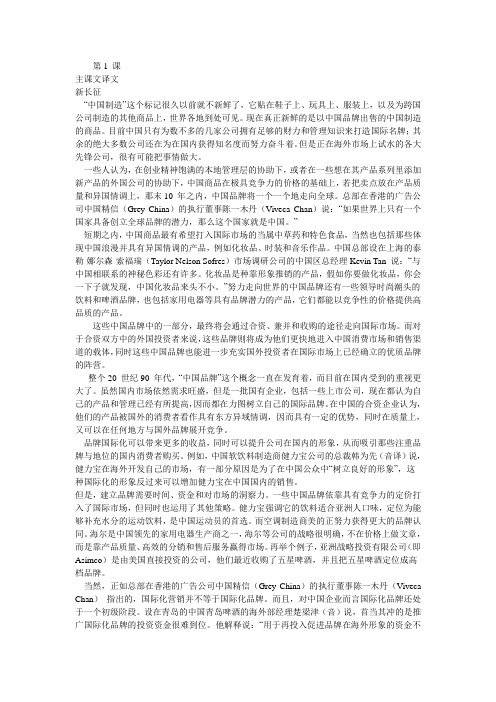
第1 课主课文译文新长征“中国制造”这个标记很久以前就不新鲜了,它贴在鞋子上、玩具上、服装上,以及为跨国公司制造的其他商品上,世界各地到处可见。
现在真正新鲜的是以中国品牌出售的中国制造的商品。
目前中国只有为数不多的几家公司拥有足够的财力和管理知识来打造国际名牌;其余的绝大多数公司还在为在国内获得知名度而努力奋斗着。
但是正在海外市场上试水的各大先锋公司,很有可能把事情做大。
一些人认为,在创业精神饱满的本地管理层的协助下,或者在一些想在其产品系列里添加新产品的外国公司的协助下,中国商品在极具竞争力的价格的基础上,若把卖点放在产品质量和异国情调上,那末10 年之内,中国品牌将一个一个地走向全球。
总部在香港的广告公司中国精信(Grey China)的执行董事陈一木丹(Viveca Chan)说:“如果世界上只有一个国家具备创立全球品牌的潜力,那么这个国家就是中国。
”短期之内,中国商品最有希望打入国际市场的当属中草药和特色食品,当然也包括那些体现中国浪漫并具有异国情调的产品,例如化妆品、时装和音乐作品。
中国总部设在上海的泰勒·娜尔森·索福瑞(Taylor Nelson Sofres)市场调研公司的中国区总经理Kevin Tan 说:“与中国相联系的神秘色彩还有许多。
化妆品是种靠形象推销的产品,假如你要做化妆品,你会一下子就发现,中国化妆品来头不小。
”努力走向世界的中国品牌还有一些领导时尚潮头的饮料和啤酒品牌,也包括家用电器等具有品牌潜力的产品,它们都能以竞争性的价格提供高品质的产品。
这些中国品牌中的一部分,最终将会通过合资、兼并和收购的途径走向国际市场。
而对于合资双方中的外国投资者来说,这些品牌则将成为他们更快地进入中国消费市场和销售渠道的载体,同时这些中国品牌也能进一步充实国外投资者在国际市场上已经确立的优质品牌的阵营。
整个20 世纪90 年代,“中国品牌”这个概念一直在发育着,而目前在国内受到的重视更大了。
重大版 高一英语 阅读课文 原文及翻译 book1 unit3可编辑word版
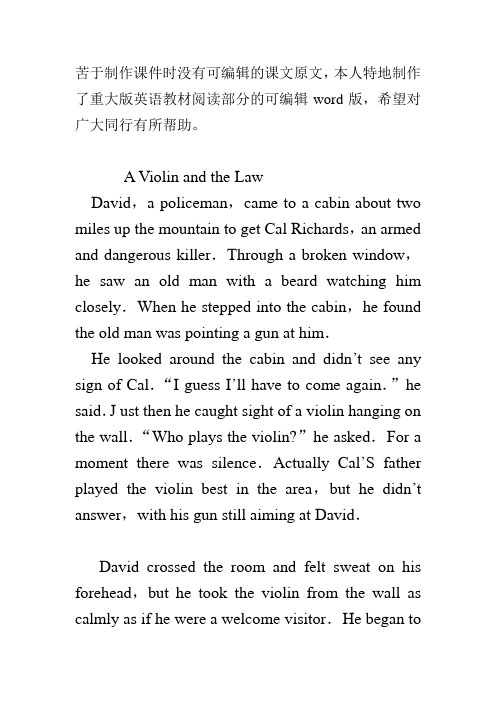
苦于制作课件时没有可编辑的课文原文,本人特地制作了重大版英语教材阅读部分的可编辑word版,希望对广大同行有所帮助。
A Violin and the LawDavid,a policeman,came to a cabin about two miles up the mountain to get Cal Richards,an armed and dangerous killer.Through a broken window,he saw an old man with a beard watching him closely.When he stepped into the cabin,he found the old man was pointing a gun at him.He looked around the cabin and didn’t see any sign of Cal.“I guess I’ll have to come again.”he said.J ust then he caught sight of a violin hanging on the wall.“Who plays the violin?”he asked.For a moment there was silence.Actually Cal’S father played the violin best in the area,but he didn’t answer,with his gun still aiming at David.David crossed the room and felt sweat on his forehead,but he took the violin from the wall as calmly as if he were a welcome visitor.He began toplay the violin,one tune after another.He was playing better than he had ever played in his life.The old man stood there,attracted.The hatred in his eyes was giving way to a look of wonder.The gun was now pointed toward the f1oor.He began to beat time,tapping one foot on the dirt floor. When the final notes of the tune died away,the old man placed the gun in a corner.“Well,stranger,”the old man said,“you play the violin excellently. Ma ybe you’ll stay for dinner and play some more for me.”After they had eaten,they sat in the spring sunshine outside the cabin.They talked about violin tunes.Not a word was said about Cal Richards.About two hours later,David stood up and said,“Sorry!I must be getting back to the town.”The old man sat,deep in thought.At last, he said,“I like the way you talk and I like the way you play the violin. I guess you’re a decent guy.”He paused as if it were hard to go on.Then,he said in a thick voice, “I’ll have a talk with Cal.I think he might give himself up tomorrow.You be at thepolice station at noon!”The next day,as the town clock struck twelve,a bearded old man came up the street towards the police station.With him was a young fellow whose appearance told of many days in hiding.小提琴和法律警察大卫来到一间往山上走约两英里处的小木屋逮捕凯尔·里查兹,他是一个全副武装的、危险的杀人凶手。
新视野大学英语(第一版)读写1课文翻译

Unit1 奔向更加光明的未来1 下午好!作为校长,我非常自豪地欢迎你们来到这所大学。
你们所取得的成就是你们自己多年努力的结果,也是你们的父母和老师们多年努力的结果。
在这所大学里,我们承诺将使你们学有所成。
2 在欢迎你们到来的这一刻,我想起自己高中毕业时的情景,还有妈妈为我和爸爸拍的合影。
妈妈吩咐我们:“姿势自然点。
”“等一等,”爸爸说,“把我递给他闹钟的情景拍下来。
”在大学期间,那个闹钟每天早晨叫醒我。
至今它还放在我办公室的桌子上。
3 让我来告诉你们一些你们未必预料得到的事情。
你们将会怀念以前的生活习惯,怀念父母曾经提醒你们要刻苦学习、取得佳绩。
你们可能因为高中生活终于结束而喜极而泣,你们的父母也可能因为终于不用再给你们洗衣服而喜极而泣!但是要记住:未来是建立在过去扎实的基础上的。
4 对你们而言,接下来的四年将会是无与伦比的一段时光。
在这里,你们拥有丰富的资源:有来自全国各地的有趣的学生,有学识渊博又充满爱心的老师,有综合性图书馆,有完备的运动设施,还有针对不同兴趣的学生社团——从文科社团到理科社团、到社区服务等等。
你们将自由地探索、学习新科目。
你们要学着习惯点灯熬油,学着结交充满魅力的人,学着去追求新的爱好。
我想鼓励你们充分利用这一特殊的经历,并用你们的干劲和热情去收获这一机会所带来的丰硕成果。
5 有这么多课程可供选择,你可能会不知所措。
你不可能选修所有的课程,但是要尽可能体验更多的课程!大学里有很多事情可做可学,每件事情都会为你提供不同视角来审视世界。
如果我只能给你们一条选课建议的话,那就是:挑战自己!不要认为你早就了解自己对什么样的领域最感兴趣。
选择一些你从未接触过的领域的课程。
这样,你不仅会变得更加博学,而且更有可能发现一个你未曾想到的、能成就你未来的爱好。
一个绝佳的例子就是时装设计师王薇薇,她最初学的是艺术史。
随着时间的推移,王薇薇把艺术史研究和对时装的热爱结合起来,并将其转化为对设计的热情,从而使她成为全球闻名的设计师。
研究生英语阅读教程(提高级 第三版)课文全翻译

课文全文参考译文第一课漏油经济:低估风险戴维伦哈特[1] 回想起来,模式似乎很清楚。
早在“深水地平线”钻机自爆前的很多年,BP 石油公司为了省钱甘冒安全的风险就已经声名狼藉。
2005 年得克萨斯州炼油厂爆炸中有15 名工人丧生。
联邦监管机构和前国务卿詹姆斯·贝克三世领导的专门小组认为,削减成本是事故的部分原因。
第二年,阿拉斯加腐蚀的管道将石油漏入普拉德霍湾。
就连乔·巴顿,对全球变暖持怀疑态度、来自得克萨斯州的共和党众议员,都谴责BP 管理人员“对安全和环境问题表现得漠不关心”。
[2] 这种冷漠大部分源于对利润的过度追求,不管出现什么情况。
但似乎也还有另一个因素在起作用,一个更普遍的人性的因素。
BP 的管理人员在估计似乎不太可能发生但一旦发生就会带来巨大损失的事件真正会发生的可能性时,犯了一个可怕的错误。
[3] 也许理解这一点最简单的方法就是思考一下BP 高管们如今的想法。
显然,考虑到清理费用和对BP 声誉的影响,高管们真希望可以回到过去,多花些钱让“深水地平线”更安全。
他们没有增加这笔费用就表明他们认为钻机在当时的状态下不会出问题。
[4] 尽管针对BP 高管的所有批评可能都是他们应得的,但是他们绝不是唯一艰难应对这种低概率、高成本事件的人。
几乎每个人都会如此。
“这些正是我们人类处理时很难做出合理反应的一类事件,”哈佛大学环境经济学家罗伯特·斯塔文斯说。
我们经常犯两种基本且性质相反的错误。
当一件事情是很难想象的,我们往往会低估它的可能性。
这就是众所周知的黑天鹅(稀有之物)现象。
大多数在“深水地平线”工作的人可能从未经历过钻井平台爆炸。
因此他们认为这不会发生,至少不会发生在他们身上。
[5] 同样,不久以前,本·伯南克和艾伦·格林斯潘也喜欢称全国房地产市场没有泡沫,因为以前从未有过泡沫。
华尔街交易员也持同样观点,他们建立的数学模型根本不存在房价下降的可能性。
科技英语阅读课文翻译UNIT1-8
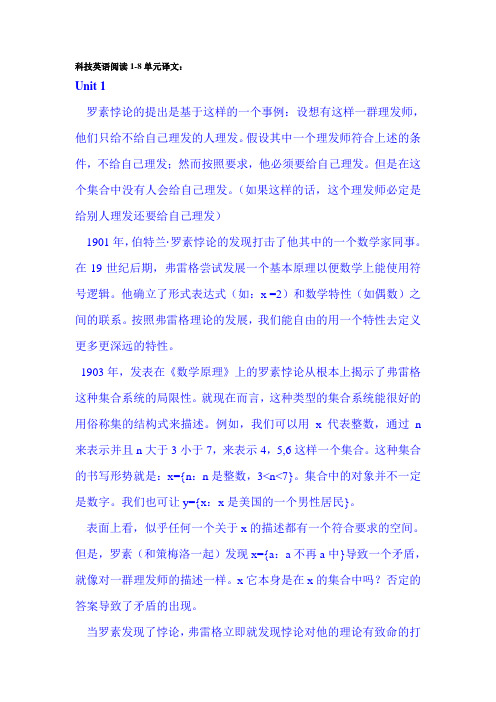
科技英语阅读1-8单元译文:Unit 1罗素悖论的提出是基于这样的一个事例:设想有这样一群理发师,他们只给不给自己理发的人理发。
假设其中一个理发师符合上述的条件,不给自己理发;然而按照要求,他必须要给自己理发。
但是在这个集合中没有人会给自己理发。
(如果这样的话,这个理发师必定是给别人理发还要给自己理发)1901年,伯特兰·罗素悖论的发现打击了他其中的一个数学家同事。
在19世纪后期,弗雷格尝试发展一个基本原理以便数学上能使用符号逻辑。
他确立了形式表达式(如:x =2)和数学特性(如偶数)之间的联系。
按照弗雷格理论的发展,我们能自由的用一个特性去定义更多更深远的特性。
1903年,发表在《数学原理》上的罗素悖论从根本上揭示了弗雷格这种集合系统的局限性。
就现在而言,这种类型的集合系统能很好的用俗称集的结构式来描述。
例如,我们可以用x代表整数,通过n 来表示并且n大于3小于7,来表示4,5,6这样一个集合。
这种集合的书写形势就是:x={n:n是整数,3<n<7}。
集合中的对象并不一定是数字。
我们也可让y={x:x是美国的一个男性居民}。
表面上看,似乎任何一个关于x的描述都有一个符合要求的空间。
但是,罗素(和策梅洛一起)发现x={a:a不再a中}导致一个矛盾,就像对一群理发师的描述一样。
x它本身是在x的集合中吗?否定的答案导致了矛盾的出现。
当罗素发现了悖论,弗雷格立即就发现悖论对他的理论有致命的打击。
尽管这样,他还不能解决这个问题,并且上世纪有很多的尝试,去解决这个问题(但没有成功)。
罗素自己对这个悖论的回答促进了类型理论的形成。
他解释说,悖论的问题在于我们混淆了数集和数集的集合。
所以,罗素介绍了对象的分级系统:数、数集、数集的集合等等。
这个系统为形式化数学的形成奠定了基础,至今它还应用于哲学研究和计算机科学分支。
策梅洛对于罗素悖论的解决方法用新的公理:对于任意公式A(x)和任意集合b,都会有一个集合满足y={x:x既在b中又满足A(x)}取代了以前的公理:对于任意公式A(x),都会有一个集合满足y={x:x满足A(x)}。
研究生英语阅读教程(基础级2版)课文翻译

第一课A 世界英语:是福是祸?汤姆·麦克阿瑟[1] 2000 年,语言学家、威尔士人格兰维尔·普赖斯,在他编辑的《英国与爱尔兰的语言》中发表了如下的观点:因为英语是个杀手。
正是英语,导致坎伯兰语、康沃尔语、诺恩语和马恩语灭亡。
在那些岛屿的部分地区,还有较大规模的群体讲比英语更古老的当地语言。
但是,现在日常生活中,英语无处不在,人人―或者说几乎人人―都懂英语。
英语威胁到那三种遗留的凯尔特语:爱尔兰语、苏格兰盖尔语和威尔士语,……所以必须意识到,从长远来看,这三种语言的未来……十分危险。
(第141 页)在此几年前,1992 年,英国学者罗伯特·菲利普森(他如今在丹麦工作)在牛津大学出版了一本书,名为《语言领域的帝国主义》。
在书中,他指出,主要的英语国家、世界范围内英语教学产业,尤其是英国文化委员会,实施的是语言扩张政策。
他还把这种政策和他所称的“语言歧视”(这个情况类似于“种族歧视”、“性别歧视”)联系在一起。
在菲利普森看来,以“白人”为主的英语世界中,起主导作用的机构和个人,或故意或无意,鼓励或者至少容忍英语大肆扩张,他们当然不反对英语的扩张。
英语的扩张开始于大约三个世纪以前,最初表现形式是经济与殖民扩张。
[2]菲利普森本人为英国文化委员会工作过几年。
和他一样,还有一些母语为英语的学者,也试图强调英语作为世界语言的危险。
在过去儿十年里,人们从三个群体的角度,就英语的国际化进行了广泛的讨论。
第一个群体是ENL 国家,英语是母语(这个群体也叫“内部圈”) ;第二个群体是ESL 国家,英语是第二语言(“外部圈”) ; 第三个群体是EFL 国家,英语是外语(“扩展圈”)。
20 世纪80 年代,这些词语开始流行。
从那时起,这第三圈实际上己扩展到全球范围。
[3]从来没有像英语这样的语言,这既有利也有弊。
曾经有许多“世界语言”, 例如:阿拉伯语、汉语、希腊语、拉丁语和梵语。
总的来说,我们现在认为这些语言比较好,经常以赞美、感激的语气谈论与它们相关的文化以及它们给世界带来的变化。
- 1、下载文档前请自行甄别文档内容的完整性,平台不提供额外的编辑、内容补充、找答案等附加服务。
- 2、"仅部分预览"的文档,不可在线预览部分如存在完整性等问题,可反馈申请退款(可完整预览的文档不适用该条件!)。
- 3、如文档侵犯您的权益,请联系客服反馈,我们会尽快为您处理(人工客服工作时间:9:00-18:30)。
英语阅读(一)课文句子翻译1. A Day’s Wait 一天的等待1、He came into the room to shut the windows while we were still in bedand I saw he looked ill. He was shivering, his face was white, and he walked slowly as though it ached to move.他走进我们房间关窗户的时候,我们还未起床。
我见他一副病容,全身哆嗦,脸色苍白,步履缓慢,好象一动就会引起疼痛。
2、But when I came downstairs he was dressed, sitting by the fire, lookinga very sick and miserable boy of nine years. When I put my hand on hisforehead I knew had a fever.可是当我来到楼下时,他已穿好衣服,坐在火炉旁。
这个九岁的男孩,看上去病得厉害,一副可怜的模样。
我用手摸了摸他的额头,知道他发烧了。
3、“All right. If you want to,” said the boy. His face was very white andthere were dark areas under his eyes. He lay still in the bed and seemed very detached from what was going on.“好的,如果你想读的话,” 孩子说。
他的脸色十分苍白,眼窝下方有黑晕。
他躺在床上一动不动,对周围发生的一切漠然置之。
3. Bringing up Children培养孩子1、It is generally accepted that the experiences of the child in his first years largely determine his character and later personality.一个人儿童时代的经历在很大程度上决定了他的性格和未来的个性,这一点是被大家所公认的。
2、All parents have to solve the problems of freedom and discipline. The younger the child, the more readily the mother gives in to his demands to avoid disappointing him. She knows that if his energies are not given an outlet, her child’s continuing development may be warped. An example of this is the young child’s need to play with the mud and sand and water.所有的父母必须解决孩子的自由与纪律的问题。
孩子越小,母亲为了不令其感到失望,就越容易对孩子的要求作出让步。
因为她知道,如果孩子的精力得不到发泄,那么他持续稳定的发展就会受到影响。
小孩子喜欢玩泥巴,沙子和水就说明了这一点。
3、Where one stage of child development has been left out, or not sufficiently experienced, the child may have to go back and capture the experience of it.如果儿童发展的某一个阶段被忽略了,或是没有得到充分的体验,那么他可能就要重返那个阶段以获得那个阶段所应获得的经验。
7 Art for Heart’s Sake为了心脏而艺术1、The problem was that while he was still a fabulously wealthy man, he had recently begun to make big mistakes. He insisted on buying companies at very high prices, only to watch them fail or go bankrupt.问题是:虽然他仍是一位拥有着令人难以置信财产的巨富,但近年来他已经在生意上开始频频出现大错了。
他总是高价买入一些公司,结果眼看着他们经营不善或破产。
2、Ellsworth was in pretty good shape for a 76-year-old , but his business failures were ruinous to his health. He had suffered his last. Heart attack after his disastrous purchase of a small railroad in Iowa.对于一位七十六岁的老人来说,埃尔斯沃思先生的身体还很不错,但是生意场上的失败却在影响着他的健康。
他上一次心脏病发作是在衣阿华州倒霉地买了一条铁路支线之后。
3、The health problem he suffered before that came about because of excitement over the failure of a chain of grocery stores, stores which he had purchases had to be liquidated at a great sacrifice to both his pocketbook and his health. They were beginning to have serious effects.在此之前他的心脏病复发,是因为一家食品杂货连锁店的经营不善而使他情绪上受到了刺激,这家商店是他在通货膨胀时期购买的。
最近他购买的公司、商店看来都得清理变卖,这时他的经济利益和身体健康都是一个巨大的损失,其后果十分严重。
4、He realized that he needed to interest the old man in something which would take his mind off his problem and redirect his energies. His answer was art.因此,卡斯韦尔医生已经做了一些积极的考虑,认为应使埃尔斯沃思先生的大脑从生意的困境中解脱出来,把他的精力转移到其它地方。
艺术便是最佳选择。
10 The Necklace 项链1、She was one of those pretty and charming girls who are sometimes,as if by a mistake of destiny,born into a family of clerks.她就是那种既漂亮又迷人的女子,仿佛是命运的错误安排,出生在一个职员的家庭。
2、She dressed plainly because she could not dress well,but her unhappiness seemed to be deeper than one might expect.她打扮不起,只得穿着一般,但是她感到非常不幸,好像这降低了她的身份似的。
3、She seemed to feel that she had fallen from her proper station in life as a woman of wealth,beauty.grace,and charm.在生活中她的位置应该是一个富有、美丽、体面和妩媚的女子,但她似乎感到跌进了苦海深渊。
4、she cared nothing for caste or rank but only for a natural fineness,an instinct for what is elegant,and a suppleness of wit.她不在意等级或地位,她只在意自然的高雅气质,对高雅事物的天生感受以及犀利灵活的大脑。
5、these would have made her the equal of the greatest ladies of the land.If only she could attain them….只有这些才能使她和最显赫的贵妇人并驾齐驱。
只要她能得到这些。
6、She suffered from the poverty of her dwelling,from the wretched look of the walls,from the worn-out chairs,from the ugliness of the curtains.因此她不断地感到痛苦。
由于自己房屋的寒碜,墙壁的粗糙,家具的破旧,衣料的庸俗,她忍受着痛苦的煎熬。
7、She had no dresses,no jewels,nothing.And she loved nothing but that;she felt made for that.She would have liked to be envied,to be charming,to be sought after.她没有华丽的服装,没有珠宝首饰,什么都没有。
然而她偏偏只喜欢这些,她觉得自己生来就是过这种日子的。
她多么希望自己能够讨人喜欢,能够被人羡慕,能够具有诱惑力而被人追求。
12.THREE DAYS TO SEE 看见光明的三天1、Only the deaf appreciate hearing ,only the blind realize the manifold blessings that lie in sight .particularly does this observation apply to those who have lost sight and hearing in adult life.只有聋子懂得听力的价值,只有瞎子才会对光明祈求不止,尤其对一个在成年期丧失了视力和听力的人,这种需求会更加强烈。
2、it is the same old story of not being grateful for what we have until we lose it. of not being conscious of health until we are ill.人们对于自己的东西往往不太珍惜,而当失去时,才懂得它的重要,生病了才知道保养身体,这已是老生常谈了。
